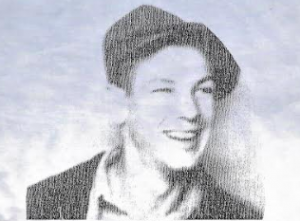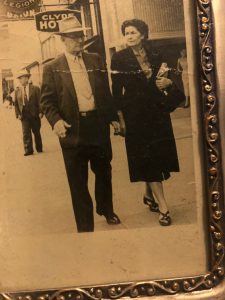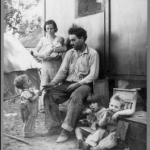Katie Elizabeth Wright is the wife to Willie Ferrell and my great grandmother. She was born in 1899 in Tennessee, but moved to the Athens area where she shared a farm a family with Willie during the great depression. Mother of five, she represents the steadfast mother of the era stubborn in her desire to see her children raised and well cared for in the rural south.
What Makes Them
She had grown old, turned forty, only to find that she didn’t much care for the world she lived in. Oh, she loved her children, all one thousand of them that it sometimes seemed she had. And she loved her husband who gave them to her, but the world which they inhabited no longer seemed like a good enough place for them all. Continue reading “What Makes Them”
Hopeful Eyes
In September of 1935, FSA photographer Dorothea Lange captured this moment between a struggling father and his surviving family in Marysville, California. The community where this family resided was mainly composed of
Edward Dean Stetson

Edward Dean Stetson was born August 30, 1917, in Arbuckle, CA. He lived here on an almond ranch with his family for the entirety of his childhood. Following this, he went to college in Sacramento and would spend the rest of his life there. He went on to become a civil engineer working for the California Department of Water Resources. He was married to his wife Phyllis for 61 years. He had 6 children, 11 grandchildren, and 4 great-grandchildren.
What We Have Left
There’s one thing that I tangibly have. Not like memory or a love letter or a eulogy. Something that I can pick up and hold. It’s a stuffed toy from Disneyland and it had a special place on my bed until I left for college. It is a stuffed Grumpy from Snow White.
Henry Cecil “Buck” Simmons

Henry Cecil “Buck” Simmons was born on August 10th, 1898 in Vinegar Bend, Alabama, a small village in Washington County, Alabama. Vinegar Bend is now only an unincorporated census-designated place, a location that is only recognized on the census because both it’s population and area are too small. He married Beulah Monk Simmons in 1919, when he was 21 and she was 18. Post-depression, they lived together in Prichard, Alabama, a city in Mobile County where they had four kids (Cecil, Marvel, Burton, and Robert). He was a barber most of his life. They eventually moved to Mobile city, where he died on February 10, 1969.
Life in the Bend
Gripping the cold, shaky metal, Buck stared intensely at the line where hair met skin on his newest client’s neck. A sensitive, 16 year old boy named Robert sat in the chair while he vented to Buck as if he was a father figure to the boy. Buck had owned this shop for two years now, but it got harder daily.
Alonzo Vickers
Alonzo Vickers was born on May 3, 1892, in Lawrenceville, Alabama, and passed away in late April of 1980. His parents were slaves and he was born a sharecropper. He would go on to get married, have children, and own his own farm.
“Hilarity Court”
Wood, Alice. “Hilarity Court.” 1938. 1632.0001/26. University of Alabama Special Collections. “Carolyn Shepard Price Home Economics Teaching Materials” collection; “Entertainments” folder.
In an October 1938 magazine article entitled “Hilarity Court” Alice Wood describes the events of a particular Halloween party. The host invites her guests to the party with a legal summons, and then takes them on a scenic tour of the property, including multiple clues and one ladder, before they arrive
The Economic Status of Negroes
Johnson, Charles S. The Economic Status of Negroes. Fisk University, 1933.
In 1933, the Conference on the Economic Status of the Negro was held on May 11-13 in Washington, D. C. Charles S. Johnson did a wonderful job taking note of all that was said. He did so well that his work, The Economic Status of Negroes, was published by Fisk University—an HBCU, or historic black college
